Content from the Brookings-Tsinghua Public Policy Center is now archived. Since October 1, 2020, Brookings has maintained a limited partnership with Tsinghua University School of Public Policy and Management that is intended to facilitate jointly organized dialogues, meetings, and/or events.
Presidential aspirants in Taiwan face a choice as they approach the island’s 2020 election, writes Ryan Hass. They may attempt to play on divisions over cross-Strait issues to seek partisan advantage, or they could choose instead to concentrate on domestic challenges that most directly touch the lives of their voters. This piece originally appeared in the Taipei Times.
The people of Taiwan should be proud of their success in consolidating democracy over recent decades. Taiwan enjoys a vibrant civil society, a flourishing media, individual liberties, and an independent judiciary that is capable of serving as a check on abuses of power. Taiwan voters have ushered in three peaceful transfers of power between major political parties in the past two decades. Nowadays, even as democracies in other parts of the world are bending under the weight of populist and nationalist surges, Taiwan steadily serves as a democratic beacon for the region and the world.
At the same time, Taiwan faces a unique challenge to its democratic form of governance from mainland China. Beijing uses a range of tools to influence attitudes in Taiwan. These include squeezing Taiwan’s international space through diplomatic isolation, co-opting Taiwan’s companies and its best talents through incentives to relocate to the mainland, exercising military power along Taiwan’s periphery, and penetrating Taiwan’s political system with monetary, cyber, and media tools. The mainland is united in its efforts to pull Taiwan closer to the mainland, with the ultimate aim of peaceful integration.
In the face of Beijing’s persistent efforts, Taiwan’s main political parties remain divided on how to respond. There are strong disagreements over questions such as: whether the mainland poses more of an economic opportunity or security threat; whether closer economic integration with the mainland would put Taiwan on a slippery slope toward becoming subsumed politically by the mainland; whether Taiwan needs to go through the mainland to reach the outside world, or whether it should bypass the mainland and open its doors to other partners; and how much priority to place on defense spending. The divides between the Blue and Green camps over cross-Strait questions run deep, have been engrained over decades of debates, and are unlikely to be bridged in the remaining months leading up to the 2020 elections.
As presidential aspirants approach the 2020 election, they will face a choice. They can seek to play on divisions over cross-Strait issues to seek partisan advantage. Or, they can choose instead to concentrate on domestic challenges that most directly touch the lives of their voters, while also uniting in opposition to external interference in Taiwan’s electoral processes. The record of recent elections shows that stoking partisan passions over cross-Strait issues can have a powerful mobilizing effect.
As politically opportunistic as it might be for politicians to seek to play on cross-Strait issues to rally support, it also could come at a cost to Taiwan’s long-term public good. Stirring up public sentiment on cross-Strait relations will not unite the people of Taiwan behind a common approach, no matter how charismatic the politician. Such attempts could, however, crowd out much needed public debates around key domestic challenges, such as how best to increase youth employment, craft a sustainable energy policy, expand access to affordable housing, reduce inequality, and improve Taiwan’s ability to attract foreign investment, innovation, and expertise.
The durability of Taiwan’s democratic model ultimately will depend upon its ability to deliver results that matter to the people of Taiwan. That is why my Brookings Institution colleague Richard Bush and I recently wrote a report encouraging Taiwan’s leaders to exercise pragmatism, including by working to build a centrist consensus between both major political parties (and other parties if possible) on the need to make the political system more effective in addressing the internal challenges Taiwan faces. Moving in this direction would revitalize public confidence in the ability of Taiwan’s democratic system to deliver on the demands and expectations of its people.
If Taiwan’s political leaders are able to find a way to set down their swords for the next year from attacking each other over cross-Strait issues, and instead work in a constructive spirit to focus political debate around how best to deliver outcomes that strengthen Taiwan’s society and economy, they would bolster Taiwan’s ability to preserve the status quo. Sustaining the status quo is an outcome that is overwhelmingly supported by Taiwan’s voters.
If, on the other hand, Taiwan’s political leaders succumb to sowing divisions over cross-Strait issues, including through attempts to use referenda to gin up support for status quo–altering initiatives, they may enjoy short-term political gain, but will do so at the risk of sapping Taiwan’s long-term strength and stability.
The biggest beneficiary of a divided Taiwan is the mainland. The mainland benefits from polarization and political stagnation in Taiwan. A more fractured political system that is less able to meet the needs of its people makes for an easier target for Beijing to pull in its preferred direction.
President Tsai Ing-wen (蔡英文) has focused the world’s attention on Taiwan’s democracy, including by describing it as the first line of defense for the free world. Now she and other leaders in Taiwan have an opportunity to set an example for the democratic world of putting the long-term interests of society ahead of the short-term interests of an election. I hope they make the most of it.
The Brookings Institution is committed to quality, independence, and impact.
We are supported by a diverse array of funders. In line with our values and policies, each Brookings publication represents the sole views of its author(s).
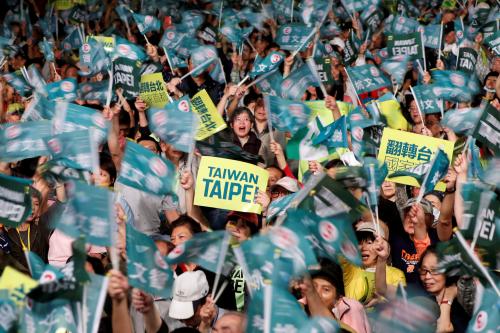
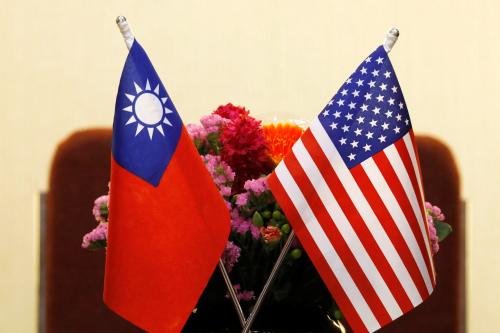
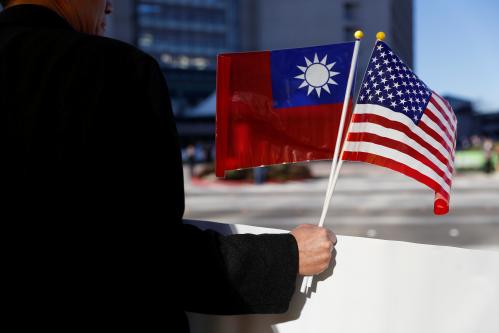
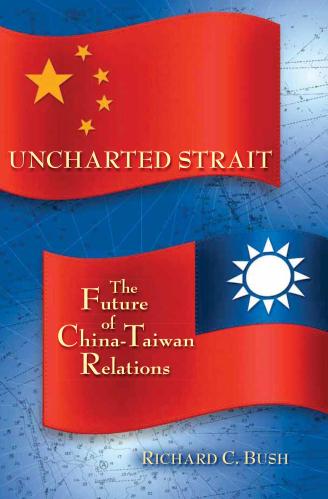

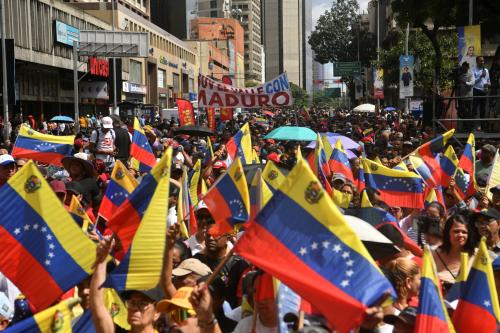

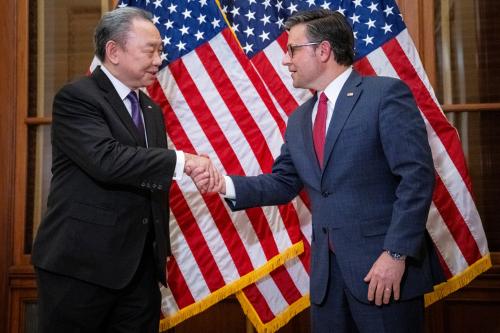
Commentary
Op-edDemocracy, the China challenge, and the 2020 elections in Taiwan
March 18, 2019